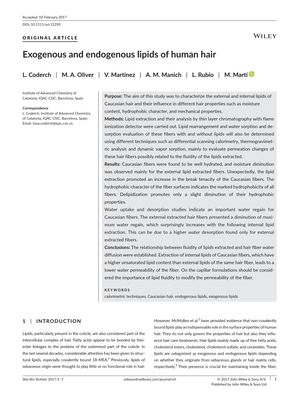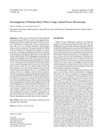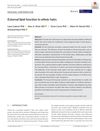Exogenous and Endogenous Lipids of Human Hair
March 2017
in “
Skin research and technology
”
lipids Caucasian hair moisture content hydrophobicity mechanical strength differential scanning calorimetry thermogravimetric analysis water sorption water desorption delipidization water uptake water diffusion unsaturated fats hair care formulations hair fiber permeability moisture water absorption water release fat removal hair products hair permeability

TLDR Removing external lipids from hair reduces moisture and increases strength, while removing internal lipids decreases water permeability.
In the 2017 study, researchers aimed to understand the role of external and internal lipids in Caucasian hair, focusing on how these lipids affect hair properties such as moisture content, hydrophobicity, and mechanical strength. They extracted lipids from hair and analyzed them, using techniques like differential scanning calorimetry and thermogravimetric analysis to assess changes in water sorption and desorption. The findings showed that Caucasian hair is well hydrated, but removing external lipids reduced moisture and surprisingly increased the hair's break tenacity. Despite delipidization, the hair maintained its hydrophobic character, with a slight decrease in hydrophobic properties. Water uptake and desorption studies revealed that hair regained a significant amount of water, but this was reduced when external lipids were removed, and then increased again after internal lipids were extracted. The study concluded that the fluidity of the extracted lipids is related to water diffusion in hair fibers, with the extraction of internal lipids (richer in unsaturated fats) leading to reduced water permeability. This suggests that lipid fluidity should be considered in hair care formulations to modify hair fiber permeability.




